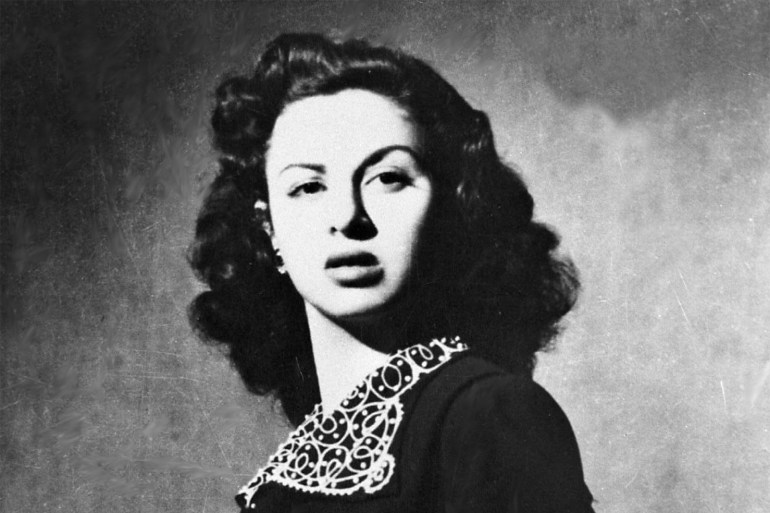At a time when the "Lady of the Arab Screen", Faten Hamama, was going through a difficult psychological crisis in the mid-sixties, after her separation from her husband Omar Sharif, she was surprised to visit an Egyptian intelligence officer to give her books on the communication, which made her realize that the role has come for her to play the role that was imposed on her. Other Egyptian film actresses for the sake of communicating for the benefit of Egyptian intelligence.
Hamama says, "It was almost a direct threat. He asked me to cooperate, so I asked him: How?" So he said: Never, just read these books. He went, and I read one of the books and did not sleep; a week I did not close an eyelid, and I hated the whole system, and I traveled I did not return to Egypt until 1971 after the death of Abdel Nasser.
During her interview with Al-Mawsour magazine - published in 1991 - Hamama confirmed that she was a supporter of the July 1952 revolution, but soon she began to feel that Gamal Abdel Nasser was a "deceiver" when he limited the ownership of lands to 200 acres, and it became 100 acres a year later. Then she became anxious as she saw people being taken from their homes to prison, and she was unable to travel outside the country without security approval.
Faten Hamama says about the era of Abdel Nasser, "The rule became harsh and I hated injustice to some patriots. Abdel Nasser was a patriotic president and honest who did not steal the country, but his regime was cruel in many times."
Faten Hamama decided to flee to Beirut in the sixties, fearing for herself and her (French) family
Escape
There was no solution but to flee Egypt, especially since, like others, she was facing strict control over traveling outside the country to attend artistic festivals, so she decided to flee to Beirut out of fear for her family and herself, out of respect for her value as "the lady of the Arab screen", and for fear that she would fall into the same trap that she fell into. There are other artists there, and she actually succeeded in traveling after the approval of Zakaria Mohieddin, the Egyptian Prime Minister.
The defeat of June 1967 was severe for Faten Hamama, and her pain increased her distance from her family and her homeland, as she says - remembering her feelings in those difficult days - “I cannot relate my feelings. I could not believe what happened, I felt that I was no longer myself, everything was destroyed in me, my pride was shattered and my confidence was shaken in everything.
And after the "1967 setback" and the subsequent trials that included the famous intelligence deviation case, in which the intelligence director Salah Nasr was tried; Gamal Abdel Nasser asked one of his top aides to inform Faten Hamama of the need to return to her homeland, because it is a "national wealth" as he described it. I firmly refused.
Faten Hamama did not return to Egypt until 1971, and she had a friendship with Mrs. Jehan Sadat (French).
Return
Faten Hamama did not return to Egypt until 1971, and she had a relationship of friendship with Mrs. Jehan Sadat, wife of the late President Anwar Sadat, and Hamama was keen to attend social events that she gathered with the president's wife, or recite poetry in front of Sadat himself, who granted her a high republican medal in 1976.
Actress since childhood
The lady of the Arab screen, born on this day May 27, 1931, says that she discovered her love for acting at the age of four, when she was acting alone in her room, and then her career in the world of cinema began as a child, when director Mohamed Karim chose her to act in front of a musician of generations Mohamed Abdel-Wahab in the movie "Happy Day" in 1940, to begin her long career that spanned over successive decades in Egyptian cinema.
During the fifties, the golden age of Egyptian cinema, she presented a group of her most amazing films, such as her role in the movie "For You, O Day Unjust" (1952) with director Salah Abu Seif, and the films "Baba Amin" and "Struggle in the Valley" with Youssef Shaheen, and then starred in it. For the movie "Doaa Karawan" with director Henri Barakat in 1959, which is one of her most important roles, if not the most important at all.
Pigeon did not find anything wrong with playing the role of a mother after she was a screen girl for years and years, so she presented the role of a mother struggling to raise her children in "Empire of Mim" (1972), and presented an important social and legal issue in the movie "I want a solution", and presented the widow who faces burdens The era of openness on "a bittersweet day".
TV drama
Hamama also left her mark in the TV drama. She presented the role of the school principal in the series "Conscience Abla Hikmat" with writer Osama Anwar Okasha and director Enam Muhammad Ali in 1991, and the series "The Face of the Moon" at the beginning of the second millennium, which sparked a great media sensation for the return of Faten Hamama to the screen. Small after a long absence.
On January 17, 2015, Faten Hamama was exposed to a severe health problem, at the age of 83, after a 70-year-long career that made her one of the most important Arab cinema artists.

